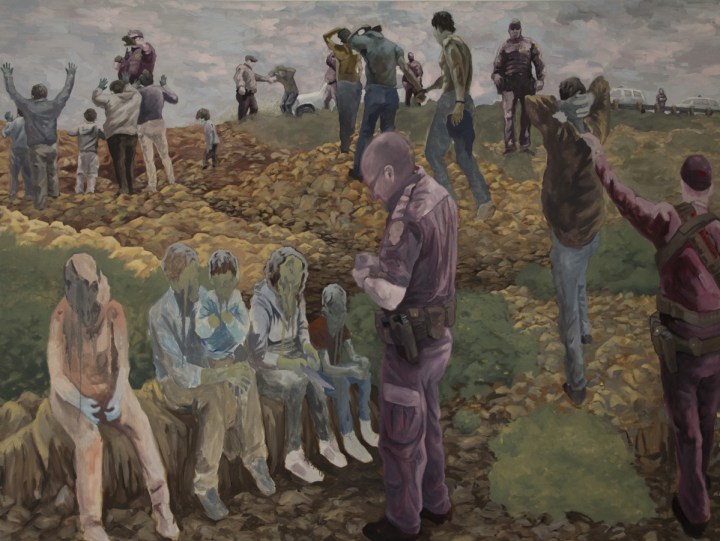(photo by Jim Barcus)
Through his figurative paintings, the 2024 Charlotte Street Visual Artist Fellow strives to elicit compassion and empathy for immigrants
“Being against kindness and compassion,” remarks Juan Diego Gaucin, “tends to be a difficult position to defend.”
The dignified way in which the Overland Park, Kansas-based artist entwines this sentiment into his work elevates his voice from mere storyteller into bold humanitarian, as visitors to “Alienation,” his recent solo show at Gallery Bogart in Kansas City, can attest.
Inspired by the experiences endured by people crossing the southern border of the United States from Central and South America, Gaucin’s oil on canvas paintings command viewers to divorce themselves from the political baggage of the topic, much like those who migrate are forced to abandon their literal belongings and perceive the ordeal from a visceral perspective. “The most important thing to take away from the work is that the politics and legalism surrounding the subject matter are a smoke screen for justifying the inhumane treatment of individuals and families for political and financial gain,” Gaucin said in a recent interview.
The artist’s imagery betrays immediately his interpretation that, despite the heated urging of our better angels, inhumane treatment of migrants is both institutionalized and commonplace. With titles like “Detention” and “Separation,” the large panels depict masses of people, simultaneously humanized and anonymous, as they suffer under the elements and at the hands of government agents whose actions are rendered with, at best, indifference and, at worst, malice. And the black-and-white illustration of a young child sleeping on the floor behind a chain-link barrier was a particularly harrowing, and brave, element of the show.

The muted colors, proliferation of barbed wire and solemn lines of human beings make thoughts of other historical and contemporary examples of mass internment difficult to evade.
Gaucin was born in Villa Insurgentes, Zacatecas, Mexico, and immigrated with his family to the United States as a child. Even in elementary school, he remembers wanting “to make art and (looking) forward to every art class offered,” although it wasn’t until he grew fatigued by his undergraduate courses as an engineering major that he enrolled in a college drawing class. It was there that he “felt a sense of belonging and harmony,” he said. “I changed to an art major that same semester, and never looked back until I graduated.” He holds a BFA degree in studio painting from Pittsburg State University in Pittsburg, Kansas.
And while Gaucin returned to Pittsburg State to complete a BS degree in chemistry, he also eventually went on to earn an MFA with Honors in Visual Art at the University of Kansas in Lawrence. He takes pride in the work it took to earn all three degrees, but he also gives himself credit for understanding that a scientific career was not his calling. “I am also proud of knowing myself well enough to realize I wouldn’t find that lifestyle fulfilling and chose to pursue my passion instead, even though it might come with significantly less financial security.”
Gaucin describes himself as “a figurative oil painter with expressionist tendencies.” His professional achievements include being named one of the Charlotte Street Foundation’s 2024 Visual Artist Fellows. In addition to an unrestricted $10,000 cash grant, the honor includes the opportunity to exhibit his work in a special exhibition at The Nelson-Atkins Museum of Art this year, starting Nov. 9.

As grateful as Gaucin is to find happiness in his artistic work, he also believes this carries a moral imperative. “Our shared American values apply universally to all human beings, and any sort of dehumanizing activity goes against our founding principles. We as a people should prioritize human beings over abstract political ideologies and rhetoric,” he said. Through work like the pieces in his “Alienation” show, the artist strives to reboot the innate sense of empathy he believes exists in humanity and help audiences bear witness to the suffering of others with righteous revulsion, regardless of how their political alignment frames the issue of migration.
In contemplating how his voice fits within Kansas City’s artistic ecosystem, Gaucin is hopeful. He recalls that even individuals who may harbor partisan grievances over his advocacy for immigrants nonetheless “respect the positive intentions.” Like many artists working in the region, he is confident that the greatest strength of Kansas City lies with its people and the tremendous diversity of ideas, backgrounds, talents and histories they bring to the civic and cultural discourse.
“The biggest challenge I would say is moving past the racial disparities and injustices of the past in a constructive and healthy way that will raise the standard of living for the most vulnerable” he said. “That being said, I would say I am very optimistic about the future.”
For more information, www.instagram.com/gaucinfineart.
